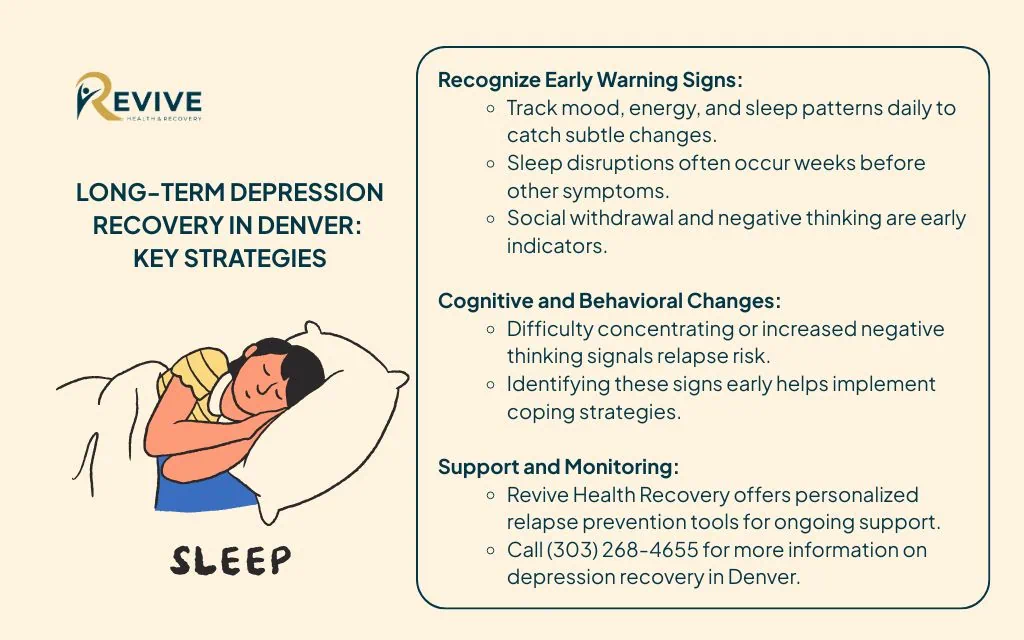Long-term depression recovery Denver requires more than completing initial treatment. It demands a comprehensive, sustained approach to maintaining mental wellness. With over 18.5% of Colorado adults experiencing depression and Denver’s unique environmental factors affecting mental health, understanding how to prevent relapse and build lasting resilience becomes crucial for your ongoing well-being.
This comprehensive guide explores proven strategies for maintaining depression recovery in the Denver metro area. From evidence-based relapse prevention techniques to accessing ongoing maintenance therapy, you’ll discover the resources, strategies, and local support systems that can help you thrive long-term in the Mile High City.
Whether you’re transitioning from acute treatment or seeking to strengthen your current recovery plan, this guide provides the roadmap you need. Your journey toward sustained mental wellness starts with understanding what long-term depression recovery truly means and how Denver’s unique environment can support your healing process.
Understanding long-term depression recovery in Denver
The reality of depression recovery statistics in Colorado
Depression affects more Denver residents than many realize. Current data reveals that depression rates exceed 15% in certain Denver census tracts, with some neighborhoods experiencing even higher concentrations of mental health challenges. This means thousands of your neighbors face similar struggles every day.
The statistics paint a concerning picture. Over 110,000 Denver residents needed mental health care but didn’t receive it according to the 2021 Colorado Health Institute report. Even more troubling, 70% of Denver residents with depression don’t seek adequate long-term care after initial treatment. This gap in ongoing support contributes to higher relapse rates and prolonged suffering.
Colorado ranks #46 nationally for overall mental health services accessibility, highlighting the need for specialized programs focused on long-term depression recovery Denver residents can access. These numbers underscore why choosing the right long-term care provider becomes critical for your sustained wellness.

Unique Denver factors affecting depression recovery
Living at 5,280 feet above sea level creates unique challenges for depression recovery. Denver’s high altitude can affect serotonin levels and mood regulation, making some individuals more susceptible to mood fluctuations. Your body produces less oxygen at this elevation, which can impact brain chemistry and energy levels during recovery.
Seasonal affective patterns in Colorado’s climate add another layer of complexity. The state’s dramatic weather changes, from intense sunshine to sudden storms, can trigger mood episodes in sensitive individuals. Denver’s 300+ days of sunshine help many people, but the rapid seasonal transitions require careful monitoring during recovery.
Urban stress factors specific to the Denver metro area include rapid population growth, housing costs, and traffic congestion. These environmental stressors can challenge your recovery if not properly managed through comprehensive long-term support strategies.
Comprehensive relapse prevention strategies
Recognizing early warning signs
Successful long-term depression recovery Denver programs emphasize early warning sign recognition. Mood pattern tracking helps you identify subtle changes before they become major episodes. Start by noting daily mood ratings, energy levels, and sleep quality in a simple journal or smartphone app.
Sleep and energy level monitoring provides crucial data about your mental state. Depression often announces itself through sleep disruptions weeks before other symptoms appear. Pay attention to changes in your sleep patterns, including difficulty falling asleep, frequent awakening, or sleeping too much.
Social withdrawal indicators include declining interest in activities you usually enjoy, avoiding friends and family, or feeling disconnected from your support network. These behavioral changes often precede mood symptoms and provide valuable early intervention opportunities.
Cognitive pattern changes manifest as increased negative thinking, difficulty concentrating, or recurring thoughts of worthlessness. Recognizing these patterns early allows you to implement coping strategies before symptoms worsen.
Concerned about warning signs? Revive Health Recovery’s depression relapse prevention Denver program provides personalized monitoring tools. Call (303) 268-4655 today.
Denver-specific relapse prevention resources
Colorado Crisis Services offers 24/7 support through the 988 Suicide & Crisis Lifeline. This statewide service provides immediate intervention when you notice warning signs escalating. Their trained counselors understand Colorado-specific factors affecting mental health and can connect you with local resources.
Community-based monitoring systems through organizations like NAMI Denver provide peer support and early intervention services. These programs connect you with others who understand the challenges of maintaining long-term depression recovery Denver residents face daily.
Integration with Denver Health behavioral services creates a seamless care network. Their behavioral health providers specialize in long-term depression management and work closely with community partners to ensure comprehensive support.
Building your personal relapse prevention plan
Trigger identification and management form the foundation of effective relapse prevention. Common triggers include stress, relationship conflicts, financial worries, or anniversary dates of traumatic events. Work with your treatment team to identify your specific triggers and develop response strategies.
Emergency contact networks in Denver should include your therapist, psychiatrist, trusted friends or family members, and crisis services. Keep these contacts easily accessible on your phone and share your plan with trusted individuals who can help during difficult times.
Medication compliance strategies ensure consistent therapeutic levels of any prescribed medications. Use pill organizers, smartphone reminders, or pharmacy auto-refill services to maintain consistency. Never stop medications abruptly without medical supervision.
Maintenance therapy options in Denver
Ongoing psychotherapy approaches
Cognitive Behavioral Therapy (CBT) maintenance sessions help you practice skills learned during initial treatment while addressing new challenges that arise. Research shows that monthly CBT sessions can reduce relapse rates by up to 50% compared to medication alone.

Interpersonal therapy continuation focuses on relationship patterns and communication skills that support long-term recovery. This approach works particularly well for individuals whose depression relates to relationship difficulties or social isolation.
Mindfulness-based cognitive therapy (MBCT) programs combine meditation practices with cognitive therapy techniques. Several Denver centers offer MBCT groups specifically designed for depression relapse prevention Denver residents need for sustained recovery.
Medication management for long-term recovery
Psychiatric medication monitoring in Denver requires coordination between your prescribing provider and other healthcare professionals. Regular medication reviews ensure optimal dosing and identify potential side effects before they impact your recovery.
Insurance coverage through Health First Colorado (Medicaid) includes comprehensive mental health benefits for qualifying individuals. Private insurance plans must provide mental health coverage equal to physical health benefits under federal parity laws.
Collaboration between primary care and psychiatry creates integrated care that addresses both your mental health and overall medical needs. This team approach improves treatment outcomes and reduces the risk of medication interactions.
Need help coordinating your medication management? Revive Health Recovery’s maintenance therapy Denver program provides comprehensive psychiatric care. Email contact@revivehealthrecovery.com for more information.
Innovative treatment modalities available locally
Ketamine-assisted therapy for treatment-resistant cases offers hope for individuals who haven’t responded to traditional treatments. Several Denver clinics now provide this innovative treatment under medical supervision for qualified candidates.
TMS (Transcranial Magnetic Stimulation) maintenance provides non-medication options for ongoing depression management. This FDA-approved treatment uses magnetic fields to stimulate brain areas involved in mood regulation.
Group therapy programs at local centers create community connections while providing ongoing therapeutic support. These programs offer cost-effective options for maintaining recovery while building social connections.
Building mental health resilience in Denver
Lifestyle interventions specific to Colorado living
Utilizing Denver’s outdoor recreation for mental health provides unique advantages for recovery. The city’s extensive trail system, parks, and recreational facilities offer natural mood boosters through physical activity and nature exposure. Regular hiking, biking, or walking in areas like Washington Park or the Cherry Creek Trail can significantly support your mental wellness.
Nutrition strategies for high-altitude living include staying well-hydrated and eating iron-rich foods to combat altitude-related fatigue. The dry climate and elevation can affect your body’s nutritional needs, making proper nutrition even more important for mental health stability.
Exercise programs adapted to Denver’s climate should account for seasonal variations and altitude effects. Start slowly if you’re new to high-altitude exercise and adjust your routine based on seasonal changes and air quality conditions.

Stress management and coping skills development
Mindfulness practices for urban living help you navigate Denver’s fast-paced environment while maintaining inner calm. Techniques like deep breathing, meditation, and grounding exercises become especially valuable during traffic jams or stressful work situations.
Time management strategies for Denver professionals address the unique challenges of working in Colorado’s growing economy. Balancing career demands with recovery needs requires specific planning and boundary-setting skills.
Work-life balance in Colorado’s culture embraces outdoor recreation and wellness, making it easier to maintain healthy boundaries. Take advantage of flexible work arrangements and prioritize activities that support your mental health resilience Denver recovery requires.
Social connection and community building
Joining Denver-area support groups provides ongoing peer connections and shared experiences. Organizations like NAMI Denver, Depression and Bipolar Support Alliance, and various recovery-focused groups offer regular meetings throughout the metro area.
Volunteer opportunities for mental health advocacy allow you to give back while maintaining your own recovery focus. Organizations like Mental Health Colorado and local community centers offer meaningful ways to stay connected and purposeful.
Building meaningful relationships post-treatment requires intentional effort and patience. Focus on quality over quantity and seek connections with people who support your recovery goals and understand your mental health journey.
Looking for community connections? Revive Health Recovery can connect you with local support networks. Call (303) 268-4655 to learn more.
Long-term support communities and resources
Denver mental health support groups
NAMI Denver support group locations and schedules provide free, peer-led support throughout the metro area. These groups meet regularly in various neighborhoods and offer both in-person and virtual options for ongoing connection and support.
Peer support programs through local organizations create opportunities to connect with others who understand your experiences. These programs often include trained peer specialists who have walked similar paths and can offer practical guidance.
Online community resources for Colorado residents bridge geographical gaps and provide 24/7 support options. Forums, video support groups, and mental health apps designed for Colorado residents offer additional layers of community support.
Professional support networks
Ongoing therapy provider networks in Denver metro offer various specialties and treatment approaches. Building relationships with multiple providers ensures backup support when your primary therapist is unavailable.
Case management services through Denver Health coordinate care between different providers and help navigate complex healthcare systems. These services prove especially valuable for individuals with multiple healthcare needs.
Coordination with primary care providers ensures your mental health treatment integrates with your overall healthcare. This collaboration helps identify medical issues that might impact your mental health and ensures comprehensive care.
Aftercare and continuing care programs
Step-down programs from intensive treatment provide gradual transitions from higher levels of care to community-based support. These programs help bridge the gap between intensive treatment and independent recovery management.
Alumni networks from local treatment centers maintain connections with others who completed similar programs. These networks often organize social events, support meetings, and educational workshops.
Long-term recovery coaching services provide ongoing guidance and accountability as you navigate the challenges of sustained recovery. Coaches help you develop practical skills and maintain motivation throughout your journey.
Navigating insurance and healthcare access in Colorado
Understanding coverage for long-term mental health care
Health First Colorado (Medicaid) mental health benefits cover comprehensive services including therapy, medication management, and case management. Qualifying individuals receive extensive coverage for ongoing depression treatment without significant out-of-pocket costs.
Private insurance mental health parity requirements ensure equal coverage for mental health and medical services. Your insurance must provide the same level of benefits for mental health treatment as they do for physical health conditions.
Out-of-pocket cost management strategies include using in-network providers, understanding your deductible and copayment requirements, and exploring payment plan options with providers. Many practices offer sliding fee scales based on income.
Accessing affordable long-term care in Denver
Community mental health center options throughout Denver provide affordable services regardless of insurance status. These centers operate on sliding fee scales and accept various insurance plans, making care accessible to diverse populations.
Sliding fee scale programs adjust costs based on your income and family size. Many private practices and community organizations offer these programs to ensure financial barriers don’t prevent access to quality care.
University-based training clinics provide supervised services at reduced costs while training the next generation of mental health professionals. These programs offer quality care with close supervision at affordable rates.
Need help understanding your insurance benefits? Revive Health Recovery works with all major insurance plans. Contact us at contact@revivehealthrecovery.com for benefits verification.
FAQs about long-term depression recovery Denver
How long should I continue maintenance therapy for depression?
Research shows maintenance therapy should continue for 12-24 months after remission, with some individuals benefiting from longer-term support depending on their history and risk factors. At Revive Health Recovery, we customize maintenance therapy duration based on your individual needs and recovery progress.
What are the most effective relapse prevention strategies in Denver?
The most effective strategies combine medication management, ongoing therapy, lifestyle interventions utilizing Colorado’s outdoor opportunities, and strong social support networks through local organizations. Revive Health Recovery integrates all these elements into comprehensive relapse prevention Denver programs tailored to your unique situation.
How do I know if I’m experiencing a depression relapse?
Warning signs include persistent mood changes lasting more than two weeks, sleep disruptions, loss of interest in activities, social withdrawal, and difficulty concentrating. Early intervention is crucial. Revive Health Recovery’s monitoring systems help identify these signs early for immediate intervention.
Are there specialized depression recovery programs in Denver?
Yes, Denver offers specialized programs through the Johnson Depression Center at CU Anschutz, various community mental health centers, and innovative treatment options like ketamine therapy at select clinics. Revive Health Recovery provides specialized outpatient programs specifically designed for long-term depression recovery Denver residents need.
How does living in Denver affect long-term depression recovery?
Denver’s high altitude can impact serotonin levels, but the city’s extensive outdoor recreation opportunities, strong healthcare infrastructure, and active wellness culture can significantly support long-term recovery. Revive Health Recovery’s programs specifically address these unique Denver factors to optimize your recovery outcomes.
Why choose Revive Health Recovery for your long-term depression care
Five reasons Revive Health Recovery excels in long-term depression support
- Comprehensive outpatient focus: We specialize in sustainable, community-based recovery without the limitations of inpatient restrictions. Our programs allow you to maintain your work, family, and social connections while receiving intensive support.
- Personalized maintenance programs: Individually tailored long-term care plans evolve with your recovery journey. We adjust your treatment approach as your needs change, ensuring continuous progress toward lasting wellness.
- Local Denver expertise: Our team maintains deep understanding of Denver’s unique environmental and cultural factors affecting mental health. We incorporate altitude considerations, seasonal patterns, and local resources into every treatment plan.
- Insurance-friendly approach: We have extensive experience working with Health First Colorado, private insurance, and affordable payment options. Our staff helps navigate insurance complexities so you can focus on recovery.
- Holistic integration: We combine evidence-based therapy with lifestyle interventions that leverage Colorado’s natural advantages. Our approach addresses mind, body, and spirit for comprehensive healing.
Your path to sustained recovery starts here
Long-term depression recovery Denver is not just possible, it’s achievable with the right support system, evidence-based strategies, and committed care team. At Revive Health Recovery, we understand that maintaining mental wellness is an ongoing journey requiring personalized attention, local expertise, and flexible treatment approaches.
The journey of long-term depression recovery Denver residents face requires more than good intentions. It demands professional guidance, community support, and comprehensive strategies that address your unique needs. Our specialized programs provide the foundation you need for lasting wellness while honoring your individual recovery timeline.
Your mental health deserves the same attention and care as your physical health. Investing in long-term depression recovery creates benefits that extend far beyond symptom management. You’ll develop resilience, strengthen relationships, and build the skills needed to thrive in all areas of life.
Ready to strengthen your long-term recovery plan? Contact Revive Health Recovery today to discuss how our specialized outpatient programs can support your ongoing mental health journey in Denver.
📍 Visit us at: 1427 S Federal Blvd, Denver, CO 80219
📧 Email: contact@revivehealthrecovery.com
📞 Call 24/7: (303) 268-4655
Don’t wait to invest in your long-term mental health. Your sustained recovery and lasting well-being are worth the commitment to ongoing care. Take the first step today by reaching out to our compassionate team who understands exactly what you’re going through and how to help you build the future you deserve.



